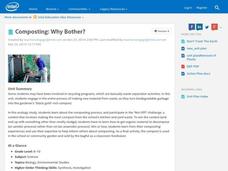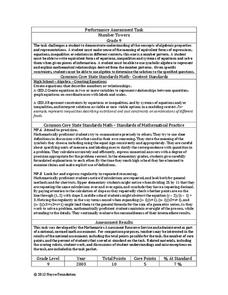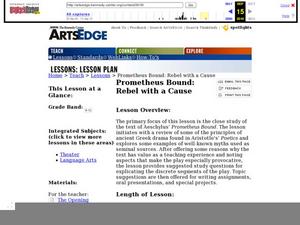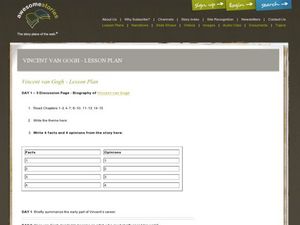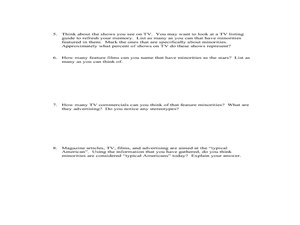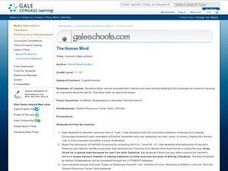Intel
Composting: Why Bother?
The first STEM lesson in a group of 10 explores composting. After discussing how to make a better tomorrow, classes are challenged to track garbage in their communities, visit a local waste management facility, and conduct a survey about...
Visa
Money Matters: Why It Pays to Be Financially Responsible
What does it mean to be financially responsible? Pupils begin to develop the building blocks of strong financial decision making by reviewing how their past purchases are examples of cost comparing, cost-benefit analysis, and budgeting.
Space Awareness
The Intertropical Convergence Zone
Young scientists know it is hotter along the equator, but why is it also rainier? Through the process of completing two experiments and a worksheet, scholars discover the answer is the intertropical convergence zone. First, they...
Inside Mathematics
Number Towers
Number towers use addition or multiplication to ensure each level is equal. While this is common in factoring, it is often not used with algebraic equations. Solving these six questions relies on problem solving skills and being able to...
Curated OER
Prometheus Bound: Rebel with a Cause
If you are teaching Aeschylus' Prometheus Bound, you can't afford to miss this source. An extensive list of ideas outlines numerous discussion topics, writing prompts, comprehension questions, oral presentations, and projects. Have class...
Curated OER
Analyzing Poetry
Use this poetry analysis learning exercise to help your learners understand a poem of their or your choosing. This resource asks class members to summarize the poem and analyze it by looking at voice, word choice, imagery, and theme. The...
Mathematics Assessment Project
Estimating Volume: The Money Munchers
Don't stuff money under your mattress. To find out why learners first complete a task determining how $24,000 in cash would affect the height of a mattress and whether this same amount would fit into a suitcase of given dimensions. They...
Inside Mathematics
Quadratic (2009)
Functions require an input in order to get an output, which explains why the answer always has at least two parts. After only three multi-part questions, the teacher can analyze pupils' strengths and weaknesses when it comes to quadratic...
Curated OER
Vocabulary Building
Use primary text documents to learn word roots. Learners listen to a reading of the Declaration of Independence and highlight words they don't know. They compile these words and guess their meanings. They discuss roots, prefixes,...
Curated OER
Formal versus Informal Language
Engage in an activity that focuses on the concepts of formal and informal language use. Middle and high schoolers compare and contrast each style by using a Venn diagram that includes some examples. They read and hear a passage of lyrics...
Curated OER
Awesome Stories: Vincent van Gogh
Who was Vincent van Gogh? Most of the questions can be answered in two or three sentences; however, there is at least one essay prompt and one personal response question that require longer answers. Questions call for a good mix of...
Curated OER
A New Look at an Old Spelling System
Introducing herself as "a discouraged professor of English education," Alleen Pace Nilsen elaborates on the prominence of incorrect spelling in education today. She laments the overuse of spellcheck (and substituting the wrong words),...
Curated OER
Worksheet for Analysis of a Letter
Dear Nancy, how do you analyze a letter? Love, Trez. Dear Trez, you use a Letter Analysis Worksheet. Love, Nancy.
This richly detailed worksheet provides multiple questions that lead researchers step-by-step through the process of...
Curated OER
Showdown in the New Wild West
What is the root of the conflict between ranchers and environmentalists? Middle schoolers write their impressions of what an environmentalist is and does. They read the New York Times article "In New Wild West, It's Cowboys vs. Radical...
Curated OER
Of Mice and Men: Chapter 3 Reading and Study Guide
Boost comprehension with an excellent reading guide for chapter 3 Of Mice and Men. Learners define four vocabulary words, note one allusion, define five literary terms, and respond to 31 short answer questions regarding the Steinbeck...
Curated OER
The Bill of Rights: Debating the Amendments
Provide your class with an opportunity to investigate an important historical document. Without identifying the document, distribute copies of the original Bill of Rights, as transcribed by John Beckley, Clerk of the House of...
Curated OER
Minorities in Mainstream American Society
So many people fought for Civil Rights in the United States. Read about the Civil Rights Act of 1964, and discuss what the act guarantees. Then pass out a slew of magazines and encourage them to observe how often minorities appear in...
Curated OER
Plagiarism: Avoiding Accidental Internet Plagiarism
Demonstrate how to cite information from Internet sources without plagiarizing. If your class is working on an Internet research paper, and you have observed learners cutting and pasting directly from the Internet, the activities and...
Curated OER
Student Opinion: Are You Popular, Quirky or Conformist?
Approach the topic of popularity with this resource from the New York Times and their Learning Network series. The article is about Alexandra Robbins' "Quirk Theory." Learners respond to the article excerpt either on paper or online....
Curated OER
Persuasive/Argumentative Essay vs. Opinion writing
Reinforce persuasive and argumentative writing skills with this lesson, which utilizes SchoolNet News Network's website/SNN Monthly magazine. Young writers review journalism writing styles that help them explain that writing a persuasive...
Curated OER
Showdown on the Frontier
Especially critical following a series of shootings in schools, theaters, and religious buildings, it's safe to say that we need to evaluate the current laws on gun control. Eighth graders read a New York Times article in order to better...
Curated OER
Summer Shorts
Want to use sequence maps in your narrative writing unit? Young writers work to create personal narratives about their summer vacation. They write a narrative of their vacation and create a display using summer clothing shapes made from...
Curated OER
The Original's Sins
Are history textbooks plagiarized? The New York Times article, “Schoolbooks Are Given F’s in Originality,” looks at this question and forms the basis for a lesson on textbooks and plagiarism. The very detailed plan includes resource...
Curated OER
Hamlet's State of Mind
Analyze various excerpts from Hamlet and read articles to develop an argument about his sanity. Middle and high schoolers write an argument essay defending whether or not they believe Hamlet is insane. You could modify this assignment...


